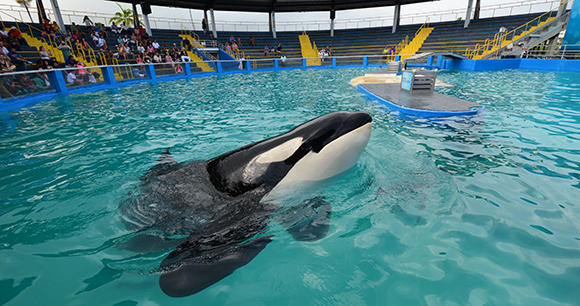Tokitae passed away on August 18, 2023. We are deeply grieved and offer our condolences to all who loved her. We will update this page at the earliest opportunity.

Tokitae (Toki), also known as Lolita and Sk’aliCh’elh-tenaut, is a 57-year-old orca (or killer whale, Orcinus orca) from the Southern Resident population in Washington’s Salish Sea. Toki was captured in 1970 as a young juvenile and has been held at Miami Seaquarium, a marine theme park, ever since. She is the last survivor of at least 45 captures of young animals from the Southern Residents in the 1960s and 1970s. She was captured before the passage of the Marine Mammal Protection Act in 1972, which means it does not cover her, but she is listed—along with her fellow Southern Residents—under the Endangered Species Act (ESA).
From the beginning of Toki’s time in captivity, her welfare has been an issue of grave concern to numerous animal protection organizations and activists, mostly due to the tiny size of her tank in a part of the Seaquarium grounds called the Whale Stadium. It is the smallest orca enclosure in the world, only 80 feet long and 35 feet wide at its widest point, and a mere 20 feet deep. When she was first sent to Miami, she had an orca companion, Hugo, who had been captured two years before her. He died in 1980, however, from a brain aneurysm. Since then, Toki has been held with a series of Pacific white-sided dolphins, many of whom she has either ignored or behaved aggressively toward.
AWI has participated in efforts to improve her situation over the years. We have also supported the focused campaigns of others who have sought to protect her. Yet the decades have passed without any appreciable change in her miserable circumstances.
Miami Seaquarium was owned by one company, Wometco, for most of its existence. In 2014, the facility was bought by Palace Entertainment, the US subsidiary of a Spanish-owned company. Neither Wometco nor Palace Entertainment ever entertained any of several proposals to move Toki to more suitable physical and social surroundings—they insisted she was “happy” where she was.
In fall 2021, the USDA Animal and Plant Health Inspection Service (APHIS) released an inspection report for Miami Seaquarium. The report indicated that Palace Entertainment’s animal management practices were well below the minimum standards required under the Animal Welfare Act (AWA) in a number of ways, including having Toki perform behaviors that led to injury. Most disturbingly, the inspector noted that the caretaking team was not reporting to or following the directions of the attending veterinarian—staff communicating closely with attending veterinarians and following their instructions is the main mechanism APHIS uses to ensure minimum animal care standards are met. Several practices, such as holding incompatible animals together, had resulted in animal deaths, including those of dolphins and sea lions. This abysmal inspection report led Miami-Dade County officials, including the mayor, to get involved in overseeing the situation at the facility.
The marine theme park changed hands again in 2022, to MS Leisure, the US subsidiary of The Dolphin Company, based in Mexico. In March 2022, APHIS issued to Miami Seaquarium a new AWA exhibitor’s license. In what we believe to be an unprecedented move, this license excluded the Whale Stadium, Toki, and her tank mate, a Pacific white-sided dolphin named Lii, from its coverage. As a result, APHIS would no longer inspect the Whale Stadium or oversee the management and care of Toki and Lii—a major point of concern for AWI. We maintain that this license runs contrary to the statute and regulations that govern animal exhibitors.
However, in stark contrast to the park’s previous owners, MS Leisure has made it clear from the outset that it was not interested in keeping Toki—its parent company specializes in “swim-with-dolphin” encounters and has no other orcas among its many other dolphin facilities in Mexico and the United States. The company has now indicated that it is willing to allow her to leave the park, to go wherever all involved parties agree she should go.
These parties include federal authorities. Because Toki is listed under the ESA, there are regulatory processes that must be followed before she can be moved to a new home. Nevertheless, it is a major step forward that various stakeholders, including high-profile donors, are willing to coordinate efforts to remove her from her tiny, dilapidated tank and appreciably improve her welfare after more than five decades of inaction.